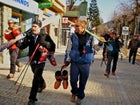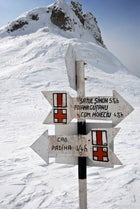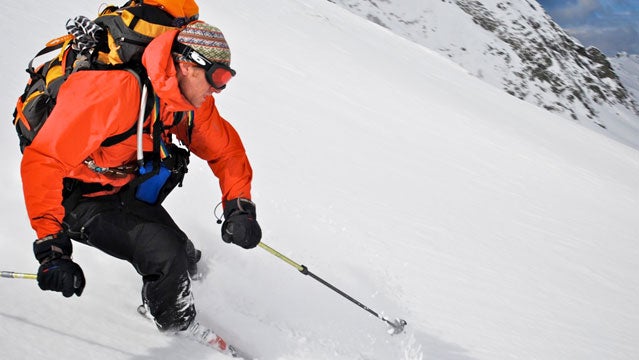ÔÇťI have an existential question,ÔÇŁ announces Jonathan, the anesthesiologist, over a breakfast of fresh bread, jam, cold hot dogs, and cheese. “Why are we here?”
 Streets of Sinaia.
Streets of Sinaia. Bucegi Range signpost.
Bucegi Range signpost.He sips from a cup of General Mills Caf├ę Fran├žais, a tin of which he has carried in his backpack halfway across the globeÔÇöfrom California to the northern fringe of Wallachia, and then (by way of two Communist-era cablecars and a pair of alpine touring skis) up and over the Bucegi scarp at the kneecap of the . ║┌┴¤│ď╣¤═° the window, grey light rises over a thin dusting of new snow on midwinter crust.
All things considered, Jonathan’s question is a welcome variation on his usual: “Where is everybody else?” We have the whole vast dining roomÔÇöindeed, the whole seven-story hotelÔÇöto ourselves. The place has the feel of an abandoned railroad station in Siberia. The only staff, as far as we can tell, are two college-age girls who stand rooted behind the reception desk as we come and go in our ski boots and a sullen waiter who appears occasionally in the dining room to field requests. There are mirrors on the walls, and marble tiles, and small craftsy landscapes rendered in grass and twigs and pebbles pasted on canvas.
We are only three days into an eight-day ski tour. We are here, of course, because it’s a place none of us has ever been before. Because there are mountains to be explored, and skiing to be done, all at a fraction of the cost of a comparable trip in, say, the Alps.
Jonathan’s younger brother, Andy, who is at this time the only general surgeon at the only hospital in the small resort town of Mammoth Lakes, California, has put a trip together and invited some friends to come along. Bill is a hand surgeon in Salt Lake City, Frank a radiologist in Oregon, Rich a thoracic surgeon in Seattle. And then there’s Joe, another friend from Mammoth, a pro skier turned speculator and man of leisure whose wifeÔÇöa beautiful Italian woman from the DolomitesÔÇöis supposed to have signed a pre-nuptial agreement that she would never stand in the way of his passion for world travel. Which, whether it’s actually true or not, seems to me a marvelous arrangement. (In my world, a trip like this will be paid for dearly in guilt, recrimination, all manner of extra home improvement projects, and the rubbing of aromatic oils on my wife’s calloused feet.)
Andy and Joe will later become embroiled in a deeply scandalous and illegal love triangle with a teenage girl. Andy, husband and father of two boys, will absent himself by way of a lethal dose of succinylcholine and potassium chloride. Joe will go to prison. But that will come later. These are the good old days, when the promise of an afternoon in the woods and an untracked lineÔÇöto say nothing of a week’s recess from family and scrounging for dollarsÔÇöstill seems like a kind of blessed dream.
OUR GUIDE, IULIAN COZMA, is an electrical engineer by training, now serving as Romania’s only full-time licensed mountain guide. He has the build and buzz-shorn cranium of a pro rugby player, a smile that draws from every muscle in his face, and an inspiring collection of the latest styles and colors in backcountry outerwear. He met us at the airport in Bucharest with a driver and a late-model Volkswagen passenger van. When, within minutes, the van’s transmission blew, he made a call on his cell phone, opened the sliding door, smiled, and asked us to please leave all our gear behind and join him for a bonus walking tour of the capital.
Bucharest proved a fine big modern city with a subway system and an eclectic blend of neoclassical, Communist-utilitarian and postmodern architecture. There were stray dogs and shopping malls and Eastern Orthodox churches. There were Parisian-style coffee houses, McDonald’s restaurants with clean restrooms, dark thickets of overhead utility lines, and Peruvian buskers in Plains Indian-style feather headdresses on the main square. On a gray winter’s day the only color came from advertisements for undergarments, electronics, and cell phone service providers.
As we walked, Iulian explained a few things about his country. The best fish in Romania, he said, is pork. The biggest industry is timber, which is sold to Arabs. The Communist dictator Ceausescu, before he and his wife were treated to a firing squad in 1989, had placed a heavy emphasis on math education. And so, Iulian explained, Romania had gone on to become the world capital of electronic crime, costing eBay upwards of a billion dollars a year. “In Romania,” he said, “honestly, there is much really black money.” Meanwhile, in those last days before the city of Sofia got its own Ikea, Bulgarians by the busload, armed with E.U. credit, were streaming into Bucharest every weekend to get cheap Swedish furniture.
Romania has a long history of accommodating well-armed visitors. It was here, more than 40,000 years ago, that Homo Sapiens may first have moved in on the Neanderthals. The Romans set up a colony here in the second century AD, extracting gold and wheat and a half million slaves, eventually abandoning the place to the Goths and the Huns. There were the Ottoman and Austro-Hungarian Empires and the Mittelm├Ąchte. World War II brought the Nazis, then the Soviets. In his two decades at the top, native son Ceausescu outlawed abortion, declared the killing of grizzly bears a capital crime (except by his own guns or those of visiting dignitaries), built one of the largest buildings in the world to house his bureaucracy and security apparatus, and then paid off 100 percent of Romania’s foreign debt, nearly starving his people in the process. Now Romania is a “full colony” of the European Union, as Iulian put it (only half jokingly), and is by far the biggest debtor nation of the International Monetary Fund.
None of this seemed to matter very much later that evening up in Sinaia, a ramble-down mountain resort town at the head of the Prahova Valley, where we dined on chicken schnitzel with potatoes and ham to an up-tempo synthesizer version of the Beatles’ “Let It Be.” As he would at every meal, Andy photographed the food in order to be able to show his family what he’d eaten while he was away from home.
“To our wives,” said Jonathan, raising a glass of quite decent local merlot.
“To our trip,” said Frank.
“To the hall pass,” said someoneÔÇömaybe it was Rich.
The real problem, Iulian announced, was that six inches of rime ice had collected during the latest storm on the safety cable of one of the higher Communist-era cablecars that was to have aided our forward progress. The cable had snapped. A new 10-kilometer cable would have to be ordered and brought from Italy, Iulian explained. Which was not likely to happen any time soon. Not to worry, we assured him. We’d brought our climbing skins.
The following morning we buckled our boots, shouldered our skis, and walked down the cobblestones to the first, still-functioning cable car that would lift us out of the valley. There were local snowboarders in one-piece camo suits blasting gypsy punk in the parking lot. A young couple in designer skinny jeans ran a sled down the plow berm.
As the tram rose above the forest toward the high, windswept plateau at the crest of the Bucegi, I asked Iulian about the bears. I’d read that, thanks in great part to Ceausescu’s draconian and self-serving conservation policies, Romania still had the largest population of brown bears in EuropeÔÇömore than five times the total number of grizzlies in Montana and Wyoming. On his grandmother’s farm, Iulian explained, it was generally budgeted that 10 out of every 100 sheep would go to the bears (and the wolves). There was some hunting allowed these days, he said. The local forestry companies permitted a handful of bears to be taken each year as trophies at around 20,000 euros a head. The best place to see a wild bear, he said, was at the dumpsters in Brasov. Then he told the story of the American woman who two summers before had been killed by a grizzly.
They had their food in the tent, he explained. There were dogs barking. The woman went out to take a photo. The bear gave her one good swipe with its paw and that was that. Iulian’s moral went like this: “You don’t make a photo with a flash to a bear that is hunted with dogs from killing sheep.”
I CAN THINK OF no more civilized way of touring an ancient European countryside than on skis in midwinter. The days are spent in leisurely (if not entirely sophisticated) conversation, marching upward or sidelong in a track cut and groomed by the fellows in front. The doctors compare their hairiest procedures (“So I got to needle her brain,” says Rich, describing how the stench of pus was enough to bring the fire department) or their most disgusting culinary exploits (“There was that pig colon soup in the Philippines,” says Andy). Jonathan gives a thorough disquisition on the history of chemical sleep aids. Frank tries to piece together a half-remembered joke about a goat-smitten Irish stonemason. Joe relates again the story of how he once got thrown in jail in Saudi Arabia.
With stray dogs in tow, we click and glide atop buried gas lines, mile after mile past iron crosses and haunting rock formations evocative of old women in babushkas, across narrow, wind-blasted traverses, through dark forests of perfect Christmas-tree spruces, around hay wagons piled high with garbage and pillaged by ravens and bears. There are mossy stone walls and handpainted trail markers with distances measured in hours. There is the carcass of a fresh, lynx-killed chamois on a slope across the gorge. There are ice-coated high-altitude weather stations, sagging shepherd’s cabins, and tin-clad refuges with dormers canted leeward toward the dawn. From solitary caretakers we purchase stone-cold beers and long expired Coca Colas that still, all these years later, taste as crisp and effervescent as when they were bottled.
We pause on minor summits, shed our climbing skins, and one after another carve squiggles down slopes of thin, old, wind-sifted powder. Then we climb again.
At night we drink palinca and wine, we play hearts, and drink some more. We dine in our hut slippers while our stinking boot liners dry by the brazier. We take turns making contact with our families on the Internet.
The news that three feet of dry, light powder have fallen on our own mountains halfway across the globe should not so greatly affect our sense of purpose. And yet it does. But then it will begin to snowÔÇöright out there in the darkness beyond our window in Romania. “It appears to be snowing,” Jonathan will observe. The rest of us, superstitious as sailors, will try not to acknowledge the stuff. But it will come, and keep coming. The next morning we will have to stomp out a new trail over the range to Sinaia through eight fresh inches of newly-fallen fluff.
Iulian’s driver will meet us in Sinaia. He will shuttle us east and north to Transylvania, to the High Fagaras range where the mountains are younger and taller and sharper. We will share the highway with horse carts and expensive German sportscars and flocks of sheep. The snow will continue. It will drive sideways across half-flooded fields of winter wheat and potatoes, over tile-roofed villages and abandoned Communist paint factories, apartment blocks, and rough-piled hay. We will not see the mountains until we are in them, winding up the old military road through the birch forest. There will be an enormous Carpathian elk standing in the road, like a magic stag. Fifty yards from the top of the cable car to B├ólea Lac the operator will have to jump out into the storm to dig passage to the wheelhouse.
“Where are all the other people?” Jonathan will ask, once again, and Iulian will offer to send his question to the Ministry of Tourism.
For two days we will ski laps in a paradise of fresh snow and jagged peaks and ice-blue sky. When finally it comes time to stuff our packs full, to hike out over the col and make the long descent to the base where we are supposed to meet the driver, we will find we would prefer to stay.
THERE’S AN OLD SAXON ski lodge just off the summit of Poiana Brasov, the local resort where Iulian first learned to ski. The lodge was built in 1887. It was commandeered and fell into disrepair under the Communists but has since been returned to the local Saxon association and restored. It has a bar, a dining room with a hand-painted ceiling and a wolfskin on the wall, a one-room museum of ski memorabilia, and cozy dormitories upstairs where guests can stay overnight.
We’ve dallied so long in the Fagaras that we’ve missed the last chairlift of the day, and so must put on our climbing skins and hike right up the empty piste to get there. The light is failing, the snow bulletproof. When finally we kick off our skis at the top, with the sun just sinking into the haze in the valley below, we find a group of locals gathered on the deck, bottles of Ursus beer in hand, shouting their way through a Romanian cover of Queen’s “We Are the Champions.”
As it happens, it’s the lodgekeeper’s birthday. He was a famous national ski racer back in his day, and all his friends and family have made the trek up the mountain for the occasion. They’re happy to have us join them for drinks and a feast, and afterwards, when the tables have been carried out and the disco lights plugged in, dancing. At some point in the colorful flashing haze of cigarette smoke, with Ricky Martin singing “La Vida Loca,” the lodgekeeper’s wife explains that this is pretty much how it was under Ceausescu: you’d take bread and a bottle of wine to the neighbors’ and drink and dance for weeks on end. “When Romanian people have problems,” she says, “they are making lots of parties.”
Later, when the little kids have already gone upstairs to bed and the old folks are drowsing in their chairs against the wall, someone finally asks: “What are you doing here?”
“Do you not see a lot of Americans?” asks Jonathan.
“Why would they come here,” the man says “when even Romanians would prefer to go to Austria?”
By now we know the answer, of course. And down the road we will look back on this as one of those brief windows of simple pleasure we almost took for granted. But now our legs hurt from skiing and dancing, our eyes are bleary, our throats are sore from singing Michael Jackson and Frank Sinatra and Falco’s “Rock Me Amadeus,” and it’s too late to try to explain.
David Page is the author of the Lowell Thomas Award-winning


